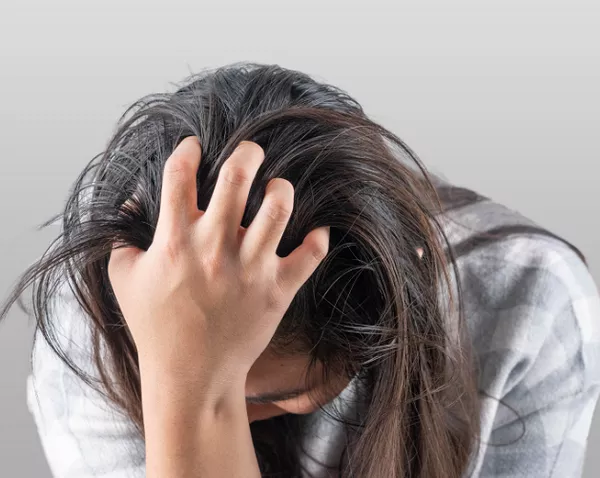In today’s fast-paced world, sleep deprivation has become a common struggle for many individuals. While the impact of lack of sleep on overall health and well-being is widely recognized, its potential correlation with hair loss remains a subject of debate. Can those restless nights actually lead to thinning hair? And more importantly, is this hair loss reversible? In this article, we delve into the scientific understanding behind the hair-sleep connection and explore the possibilities of restoring hair growth for those who have experienced hair loss due to insufficient sleep.
1: The Hair-Sleep Connection: Unraveling the Science Behind It
To comprehend the potential link between lack of sleep and hair loss, it is essential to understand the hair growth cycle. The hair growth process consists of three distinct phases: anagen (growth), catagen (transition), and telogen (resting). During the telogen phase, hair strands eventually shed to make room for new growth.
Sleep plays a crucial role in maintaining the delicate balance of this cycle. Numerous studies have revealed that sleep deprivation can disrupt hormone regulation, specifically cortisol and melatonin, which are intimately connected to hair growth. Elevated cortisol levels associated with stress can lead to inflammation, follicle miniaturization, and premature hair loss. Simultaneously, reduced melatonin production hampers the antioxidant protection required for healthy hair growth.
While it is evident that sleep deprivation can impact hormone levels, it is important to note that hair loss caused by lack of sleep is often a temporary condition. Once sleep patterns are normalized, hair growth is likely to resume its natural cycle.
2: Shedding Light on the Reversibility of Hair Loss from Sleep Deprivation
The good news for individuals experiencing hair loss due to lack of sleep is that this condition is often reversible. Addressing the underlying causes and adopting healthier sleep habits can help restore hair growth.
1.Prioritize Sleep Hygiene:
Establishing a consistent sleep schedule, creating a conducive sleep environment, and practicing relaxation techniques before bed can significantly improve the quality and quantity of sleep. This, in turn, supports the body’s natural processes, including hair growth.
2.Manage Stress Levels:
Stress management techniques such as exercise, meditation, and deep breathing exercises can help regulate cortisol levels, reducing inflammation and the negative impact on hair follicles.
3.Adopt a Nutrient-Rich Diet:
Eating a well-balanced diet that includes essential vitamins and minerals, such as biotin, zinc, iron, and vitamin D, promotes healthy hair growth. Consult with a healthcare professional or nutritionist for personalized dietary recommendations.
4.Protect Your Hair:
Avoid excessive heat styling, harsh chemicals, and tight hairstyles that can further weaken the hair shaft. Opt for gentle hair care practices and use products specifically designed to nourish and protect the hair.
3: Restoration Strategies: Combating Hair Loss Caused by Insufficient Sleep
In addition to improving sleep patterns and addressing underlying causes, certain restoration strategies can be employed to accelerate the regrowth of hair affected by sleep deprivation.
1.Topical Treatments:
Applying over-the-counter topical treatments containing minoxidil can help stimulate hair growth by increasing blood circulation to the hair follicles. However, it is advisable to consult a dermatologist before using any products.
2.Laser Therapy:
Low-level laser therapy (LLLT) has shown promising results in stimulating hair growth. This non-invasive treatment involves exposing the scalp to red light, which is believed to enhance cellular activity and promote hair follicle function. Consultation with a healthcare professional or dermatologist is recommended to determine the suitability and effectiveness of this therapy.
3.Platelet-Rich Plasma (PRP) Therapy:
PRP therapy has gained popularity in recent years as a treatment for hair loss. This procedure involves extracting the patient’s own blood, separating the platelet-rich plasma, and injecting it into the scalp. The growth factors present in the plasma are believed to stimulate hair follicles and promote hair regrowth. However, more research is needed to establish the efficacy of PRP therapy specifically for sleep deprivation-related hair loss.
4.Professional Hair Treatments:
Consulting a trichologist or a hair specialist can provide valuable insights and personalized treatment options for individuals experiencing hair loss due to lack of sleep. They may recommend procedures such as mesotherapy or microneedling, which involve delivering essential nutrients and vitamins directly to the scalp to stimulate hair growth.
Conclusion:
While it is true that lack of sleep can contribute to hair loss, the good news is that this condition is often reversible. By addressing the underlying causes of sleep deprivation and adopting healthier sleep habits, individuals can restore their hair growth to its natural cycle. Furthermore, incorporating stress management techniques, maintaining a nutrient-rich diet, and protecting the hair from damaging practices can aid in promoting healthy hair growth.
For those seeking additional support, various restoration strategies such as topical treatments, laser therapy, PRP therapy, and professional hair treatments can be explored under the guidance of healthcare professionals or dermatologists. However, it is essential to note that results may vary, and individual consultation is crucial to determine the most suitable approach for each person.
Remember, while a good night’s sleep is essential for overall well-being, it also plays a vital role in maintaining the health and vitality of our hair. So, prioritize your sleep, nurture your body, and watch your hair regain its natural luster and volume once again. Sleep tight, and let your hair thrive!

